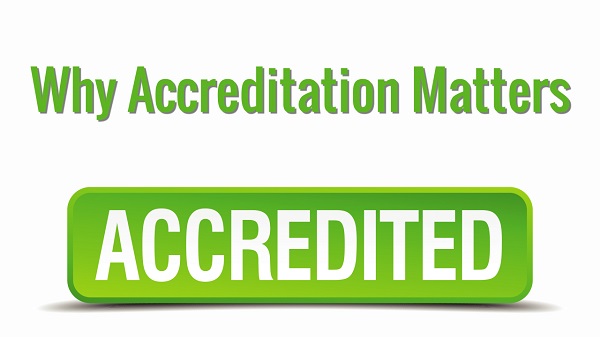

Why Accreditation Matters
According to the United States Department of Education, accreditation means that an institute of higher learning has demonstrated commitment to providing courses and programs that allow students to make practical use of the skills they have acquired. For some students, this means graduating from one college and immediately enrolling in another one to continue training for a professional career. Other students who graduate from an accredited school immediately apply for employment in their field. Although accreditation is voluntary, a college that receives it must demonstrate rigorous standards of excellence.
Different Types of Accreditation
There are two main types of accreditation available to all types of colleges. These include:
- Institutional Accreditation: This status refers to the college or university as a whole. It’s important for prospective students to keep in mind that just because an institution has earned accreditation, it doesn’t mean that every program within it has.
- Professional or Specialized Accreditation: The head of specific programs within a college may choose to apply for separate accreditation. When an accrediting body evaluates a specialized program, its members pay attention to student learning outcomes or expected competencies after completing the program. Since many professions require students to graduate from an accredited specialty program, it’s important for students to ensure that a program is accredited before enrolling in it.
Questions Prospective Students Should Ask Every College
Before seriously considering enrolling in an online or degree program, future students should know if the school itself or a specific program it offers is accredited. If the answer is no, he or she may want to keep looking. While the college may offer some valuable courses and career training, many employers and universities offering advanced degree programs don’t consider credits from an unaccredited college to be valid. Students should also consider asking the following questions:
- Does completing a specific degree or program allow the student to become certified or sit for a required exam?
- Does the fact that the school is accredited have any bearing on financial aid eligibility?
- What percentage of graduates obtains a position in their career of choice?
Brighton College’s Accreditations and Memberships
Brighton College, originally founded under the name Modern Schools, Inc. in 1961, offers certificate, diploma, and degree programs in business, allied health, paralegal and criminal justice, information technology, and continuing education for professionals. As a distance learning college, we offer all of our coursework online. Depending on the specific program chosen by the student, he or she can expect to graduate from Brighton College in 12 to 30 months.
Because we are committed to the ongoing success of our students, Brighton College is licensed by the Arizona State Board for Private Postsecondary Education and is accredited by the Distance Education Accrediting Commission (DEAC). Additionally, we hold membership or affiliation with the following organizations:
- American Health Information Management Association (AHIMA)
- American Medical Billing Association (AMBA)
- Association for Healthcare Documentation Integrity (AHDI)
- Council for Higher Education Accreditation (CHEA)
- Pharmacy Technician Certification Board (PTCB)
Students who are interested in learning more about our various career programs should contact us today.
